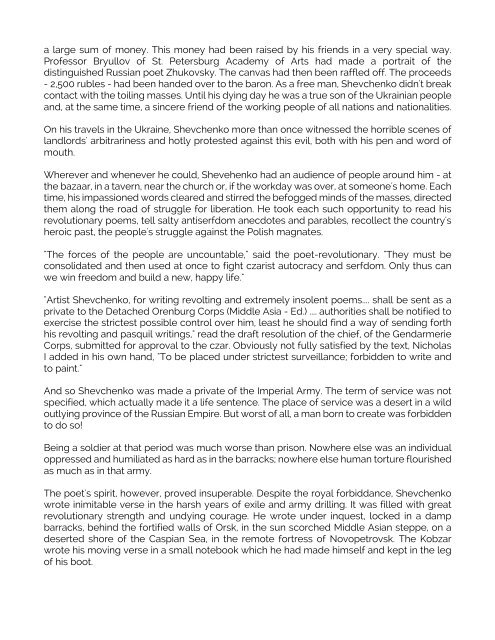PoetsGardenArrowParkNY_dl
You also want an ePaper? Increase the reach of your titles
YUMPU automatically turns print PDFs into web optimized ePapers that Google loves.
a large sum of money. This money had been raised by his friends in a very special way.<br />
Professor Bryullov of St. Petersburg Academy of Arts had made a portrait of the<br />
distinguished Russian poet Zhukovsky. The canvas had then been raffled off. The proceeds<br />
- 2,500 rubles - had been handed over to the baron. As a free man, Shevchenko didn't break<br />
contact with the toiling masses. Until his dying day he was a true son of the Ukrainian people<br />
and, at the same time, a sincere friend of the working people of all nations and nationalities.<br />
On his travels in the Ukraine, Shevchenko more than once witnessed the horrible scenes of<br />
lan<strong>dl</strong>ords' arbitrariness and hotly protested against this evil, both with his pen and word of<br />
mouth.<br />
Wherever and whenever he could, Shevehenko had an audience of people around him - at<br />
the bazaar, in a tavern, near the church or, if the workday was over, at someone's home. Each<br />
time, his impassioned words cleared and stirred the befogged minds of the masses, directed<br />
them along the road of struggle for liberation. He took each such opportunity to read his<br />
revolutionary poems, tell salty antiserfdom anecdotes and parables, recollect the country's<br />
heroic past, the people's struggle against the Polish magnates.<br />
"The forces of the people are uncountable," said the poet-revolutionary. "They must be<br />
consolidated and then used at once to fight czarist autocracy and serfdom. Only thus can<br />
we win freedom and build a new, happy life."<br />
"Artist Shevchenko, for writing revolting and extremely insolent poems.... shall be sent as a<br />
private to the Detached Orenburg Corps (Mid<strong>dl</strong>e Asia - Ed.) .... authorities shall be notified to<br />
exercise the strictest possible control over him, least he should find a way of sending forth<br />
his revolting and pasquil writings," read the draft resolution of the chief, of the Gendarmerie<br />
Corps, submitted for approval to the czar. Obviously not fully satisfied by the text, Nicholas<br />
I added in his own hand, "To be placed under strictest surveillance; forbidden to write and<br />
to paint."<br />
And so Shevchenko was made a private of the Imperial Army. The term of service was not<br />
specified, which actually made it a life sentence. The place of service was a desert in a wild<br />
outlying province of the Russian Empire. But worst of all, a man born to create was forbidden<br />
to do so!<br />
Being a soldier at that period was much worse than prison. Nowhere else was an individual<br />
oppressed and humiliated as hard as in the barracks; nowhere else human torture flourished<br />
as much as in that army.<br />
The poet's spirit, however, proved insuperable. Despite the royal forbiddance, Shevchenko<br />
wrote inimitable verse in the harsh years of exile and army drilling. It was filled with great<br />
revolutionary strength and undying courage. He wrote under inquest, locked in a damp<br />
barracks, behind the fortified walls of Orsk, in the sun scorched Mid<strong>dl</strong>e Asian steppe, on a<br />
deserted shore of the Caspian Sea, in the remote fortress of Novopetrovsk. The Kobzar<br />
wrote his moving verse in a small notebook which he had made himself and kept in the leg<br />
of his boot.


